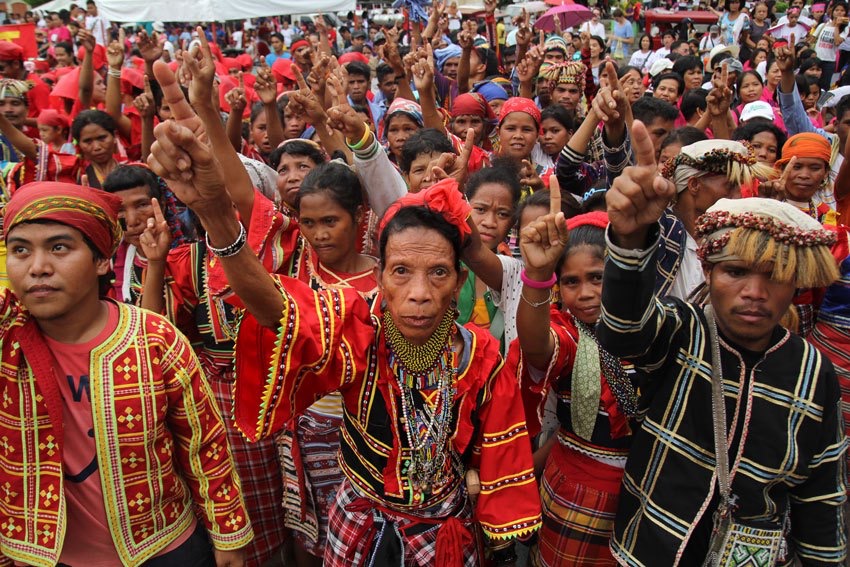Daily 8: What You Should Know About the Lumads
Sep 10, 2015 • 8List

Sep 10, 2015 • 8List
The Philippines is known for its ethnic and indigenous groups, all of which complete and give life to the Filipino identity, setting us apart from already diverse Southeast Asian culture.
Most of us go through our daily routines unaware that some, if not all, of our brothers and sisters around the country are facing serious dilemmas.
A recent story about the Lumad killings erupted on the Internet and sent various human rights groups clamoring for justice, knocking on President Aquino’s door to ask for some kind of explanation—or even reassurance—that help is indeed reaching the Lumad ethnic tribes.
If news hasn’t reached you, here’s a timeline of the devastating events surrounding the Lumads:
Education is a right that should be given to everyone, especially the youth, which was why in 2004, ALCADEV (Alternative Learning Center for Agriculture and Livelihood Development) was established as an alternative school for the indigenous youth of the Lumad groups, composed of 18 ethnic tribes in Mindanao. Unlike other schools, it has its own curriculum designed solely to teach students skills related to agriculture and to promote the importance of preserving their roots.
In April 2014, reports of attacks in Lumad schools started surfacing as members of the Armed Forces of the Philippines (AFP) allegedly raided schools, harassed teachers and students and forced them out.
The reason for the attacks? Military control over the locations of the schools, which were apparently prospect areas for logging, plantation expansion and mining activities—all covered up by an alleged sanctioned order by the Department of Education (DepEd), saying that the locations of the schools were suspected hideouts of the country’s infamous rebel group, the New People’s Army (NPA).
The Lumads considered the possibility that the presence of military personnel was not for protection but was instead to claim the lands or to allow private companies to perform mining and logging operations. The Lumads fought back to rightfully protect and defend their lands and source of livelihood. Since then, a rift between the AFP (or certain mining firms) and the Lumads erupted, and killings of Lumads have been up for tallying.
On September 1, 2015, news of the burning of a school cooperative building broke, along with reports of the gruesome murder of Emerico “Emok” Samarca. The report tagged Magahat-Bagani, a paramilitary force allegedly controlled by the 36th Infantry Battalion of the Philippine Army, as the suspected attacker.
Also killed was Dionel Campos, the Lumad community leader and chair of the Lumad’s group, Maluhutayong Pakigbisog Alansa sa Sumusunod (MAPASU), known for fighting for the ancestral lands of the Lumads against perpetrators.
The clash and attacks forced at least 700 Lumad families to flee their homes and evacuate to various parts of Davao and Bukidnon to seek refuge.
What the Lumads thought to be a symbol of shelter drastically turned into a nightmare as the reported rape of a 14-year-old Lumad refugee at the hands of three members of the military was confirmed, with two of them identified under the aliases “Galot” and “Daniel.” The girl’s parents, however, refused to press charges after they agreed to a P63,000 settlement. The three Army soldiers are being held for further investigation.
And where, do you ask, is the President in all these? Making speeches and making statements like, “There is no campaign to kill anybody in this country. There is a campaign to go after the culprits of these crimes regardless of who they are.”
But then again, our beloved President, actions speak louder than words.
Yesterday, #StopLumadKillings trended on Twitter with several human rights groups on the front line, asking the President to do more. Websites for petitions have also surfaced online, seeking help to keep the Lumad children in school and even to offer safer places to evacuate in order to assure the protection of the Lumads.
Several netizens also expressed their sympathy and concern online, praying for the Lumads and hoping that the indigenous group gets genuine help:
Haiku for Sir Emok All can delve no fear; Born of the earth empowered; Your blood-drenched soil lives! #StopLumadKillings
— RepCarlos.I.T.Zarate (@karlos_ysagani) September 7, 2015
We don’t need to gaze as far as Europe to be reminded that a boy is being killed, …by structural terror and injustice. #StopLumadKillings
— Noem Lardizabal-Dado (@momblogger) September 6, 2015
Ongoing: #UPFight students light candles for #stoplumadkillings pic.twitter.com/DVtZp3ksqw
— Einstein Recedes (@Enteng_Itneg) September 9, 2015
May the souls of the victims rest in peace and those perpetrators be restless because of guilt. #StopLumadKillings
— irish !!! (@ayrtorres) September 10, 2015
: #StopLumadKillings! Stop the rape of their people and their land! Stop the violence and neglect!
— LANA DEL REY VALERA (@Watdahel_Marcel) September 9, 2015
Thanks for expressing concern over Syria but pls don’t forget your fellow Filipinos. Lumads being killed in #Mindanao ! #StopLumadKillings
— Irene Mindanaoan.com (@mindanaoan) September 6, 2015
The University of the Philippines (UP) yesterday held a dialogue with ALCADEV teachers and students to help raise awareness about the issue and to emphasize the need for a call for help. The Lumads were also able to speak up about the issue and let the Filipino people and the whole world know their side.
SOS CARAGE: Ang simpleng pagpost sa Facebook at pagtweet sa Twitter ay mahalaga para mapakalat ang mga isyu ng mga Lumad. #StopLumadKillings
— Philippine Collegian (@phkule) September 9, 2015
Are you on their side? Make it known. Help raise awareness. #StopLumadKillings.
What’s your take on the #StopLumadKillings issue? Share them in the comments section below.
Input your search keywords and press Enter.
